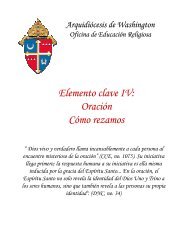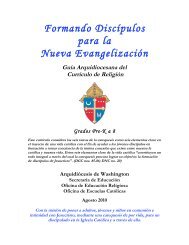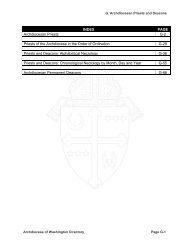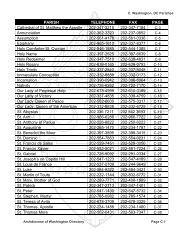10. Funerals - Archdiocese of Washington
10. Funerals - Archdiocese of Washington
10. Funerals - Archdiocese of Washington
Create successful ePaper yourself
Turn your PDF publications into a flip-book with our unique Google optimized e-Paper software.
<strong>10.</strong>11.5 In the cases described above, the words spoken in remembrance <strong>of</strong> thedeceased that are prepared and submitted in advance are:a. to be simple and brief, lasting no more than five minutes;b. to address solely the life <strong>of</strong> the deceased in relation to his or herCatholic faith; 1206 andc. to avoid any suggestion that the deceased is “in heaven,” which,among other things, implies that he or she is not in need <strong>of</strong> theprayers and suffrages <strong>of</strong> the Church. 1207<strong>10.</strong>11.6 Since, unlike the homily, words <strong>of</strong> remembrance form no part <strong>of</strong> the Liturgy<strong>of</strong> the Word, they should not be made from the pulpit or ambo, but are to begiven from some other appropriate place designated by the pastor. 12081206 These remarks must not include anything that is contrary to the Catholic faith, scandalous, <strong>of</strong>fensive,<strong>of</strong>f-color, or otherwise inappropriate to a celebration <strong>of</strong> Christian faith and hope in the context <strong>of</strong> aCatholic funeral liturgy.1207 CCC 1032; cf. MI, norms, 3; ibid., other concessions, 29. Pope Paul VI, Apostolic ConstitutionIndulgentiarum doctrina, (1967) 2-3, in MI: “It is a divinely revealed truth that sins bring punishmentsinflicted by God’s sanctity and justice. These must be expiated either on this earth through the sorrows,miseries and calamities <strong>of</strong> this life and above all through death, or else in the life beyond through fire andtorments or ‘purifying’ punishments…. These punishments are imposed by the just and mercifuljudgment <strong>of</strong> God for the purification <strong>of</strong> souls, the defense <strong>of</strong> the sanctity <strong>of</strong> the moral order and therestoration <strong>of</strong> the glory <strong>of</strong> God to its full majesty…. That punishment or the vestiges <strong>of</strong> sin may remain tobe expiated or cleansed and that they in fact frequently do even after the remission <strong>of</strong> guilt is clearlydemonstrated by the doctrine on purgatory. In purgatory, in fact, the souls <strong>of</strong> those ‘who died in thecharity <strong>of</strong> God and truly repentant, but before satisfying with worthy fruits <strong>of</strong> penance for sinscommitted and for omissions,’ are cleansed after death with purgatorial punishments. This is also clearlyevidenced in the liturgical prayers with which the Christian community admitted to Holy Communionhas addressed God since most ancient times: ‘that we, who are justly subjected to afflictions because <strong>of</strong>our sins, may be mercifully set free from them for the glory <strong>of</strong> thy name.’” MI, norms, 2: “An indulgenceis partial or plenary according to whether it removes either part or all <strong>of</strong> the temporal punishment duesin.” Idem, 3: “The faithful can obtain partial or plenary indulgences for themselves, or they can applythem to the dead by way <strong>of</strong> suffrage.” See also CCC 1030-1032, 1471-1479. DPP 251: “[The pious custom<strong>of</strong> suffrage for the souls <strong>of</strong> the faithful departed] is an urgent supplication <strong>of</strong> God to have mercy on thesouls <strong>of</strong> the dead, to purify them by the fire <strong>of</strong> His charity, and to bring them to His kingdom <strong>of</strong> light andlife. This suffrage is a cultic expression <strong>of</strong> faith in the communion <strong>of</strong> saints. Indeed, ‘the Church in itspilgrim members, from the very earliest days <strong>of</strong> the Christian religion, has honored with great respect thememory <strong>of</strong> the dead; and “because it is a holy and a wholesome thought to pray for the dead that theymay be loosed from their sins” (2 Mac 12: 46) she <strong>of</strong>fers her suffrages for them’ [LG 50]. These consist,primarily, in the celebration <strong>of</strong> the holy sacrifice <strong>of</strong> the Eucharist [Second Council <strong>of</strong> Lyons, Pr<strong>of</strong>essio fideiMichaelis Palaeologi imperatoris (1274): DS 856; Saint Cyprian, Epistula 1 2; Saint Augustine, Confessiones IX,12 32], and in other pious exercises, such as prayers for the dead, alms deeds, works <strong>of</strong> mercy [SaintAugustine, De curis pro mortuis gerenda 6; Saint John Chrysostom, Homilia in primam ad Corinthios 41 5],and the application <strong>of</strong> indulgences to the souls <strong>of</strong> the faithful departed.”









